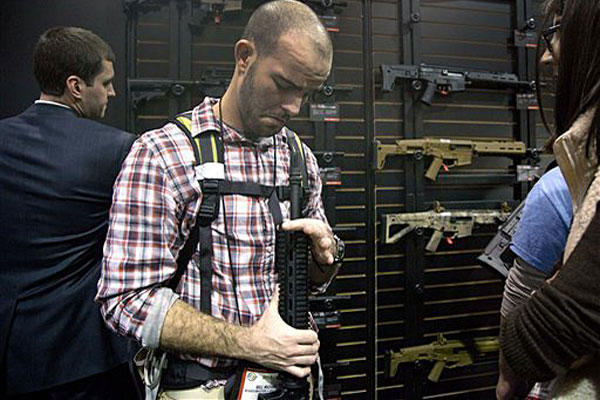LAS VEGAS -- A quiet tension hung over the show floor here at the country’s largest gun show as America continues to mourn the victims of the Newtown tragedy and the nation inches closer to its second assault weapons ban.
Gun makers work toward Shot Show all year long and often make last-minute refinements to new prototypes and production models just hours before their planes leave for Vegas. The National Shooting Sports Foundation’s event is the premier venue for these companies to showcase their newest innovations in the hunting and tactical firearms industry.
Just weeks after the horrific massacre of small school children in Newtown, Conn., President Obama launched one of the most comprehensive efforts to address gun violence since Congress passed the 1994 ban on military-style weapons. The ban expired in 2004, and Obama wants lawmakers to renew and expand it.
Commercial versions of military weapons such as the M4 carbine and M16 rifle are extremely popular with firearm enthusiasts. Within the past decade, these semiautomatic rifles, chambered in either 5.56mm or 7.62mm, have become accepted icons of American society. Combat veterans often end up buying weapons very similar to the ones they fought with in Iraq and Afghanistan.
As a result, America’s small arms industry has grown into a massive market. New gun makers continue to pop up, creating stiffer competition.
But the general feeling among many of the thousands of attendees of this year’s Shot Show is that the recent mass shootings in places like Newtown and Aurora, Colo., combined with the push for a new assault weapons ban, threaten to cripple the small arms industry and cause further damage to the economy.
The show is not open to the public; attendance is restricted to trade professionals and commercial buyers and sellers of military, law enforcement and tactical products and services.
“Restricting the manufacturing and the sale of a class of weapons is going to be devastating for the economy,” said Paul Leithner-Wise, owner of Leithner-Wise Manufacturing, a small custom shop launched in 2012 that focuses specifically on AR15-style weapons. “I mean, let’s face it, at this moment the gun industry is one of the driving forces of the economy.”
The National Shooting Sports Foundation estimated that the economic impact of firearm sales totaled $31 billion in 2011, up from $19 billion in 2008. The U.S. Gross Domestic Product in 2011 was $14.8 trillion.
Amid the sound of new weapons firing on the range portion of the show, Leithner-Wise talked about his plans to unveil a new carbine next month and his worries for the future.
“I don’t believe that the banning of any class of weapon would solve the gun violence problem this country has,” he said. “I don’t think banning assault rifles … would achieve anything; they are a minimal statistic in violent crime.”
A nationwide ban would be very hard on gun companies, but equally as hard on the support companies that make custom replacement parts and accessories, high-quality magazines and precision barrels for match-level shooting competitions.
“If that is taken away because of a knee-jerk reaction to a very unfortunate event … then you are not affecting one group of people, you are affecting multiple groups of people,” he said.
Most were not as willing as Leithner-Wise to talk about the issue on the show floor. But it was very clear from the mixture of sighs, flip comments and body language that many here are fearful about their job prospects for the future.
Jimmy Stavrakis, president of Adcor Industries Inc., on the other hand, said he’s not losing any sleep over this issue until he has seen specific details of the plan.
Stavrakis owns Adcor Defense, a fledgling arms manufacturer that is currently a contender in the Army’s Improved Carbine Competition.
“We don’t want to see an assault weapons ban,” said Stavrakis. “But we are going to abide by the letter of the law.”
One question that continues to concern people is whether the government would try to confiscate weapons that were purchased legally but end up falling under the ban.
“Is it possible to ban all assault weapons and confiscate them? How is that possible?” he said.
Leithner-Wise made it clear that the issue scares him.
“If there is a ban, I don’t see anyone taking up arms or anything like that,” he said. “What scares me is if there is confiscation -- that is when there will be a dynamic shift in the United States. That is when if people resist confiscation and some people get killed, that is when I can see people taking up arms. It’s not a good situation for anyone.”
In addition to a ban, Obama wants Congress to do away with high-capacity ammunition magazines and require background checks for all gun buyers in an attempt to close the so-called "gun-show loophole" that allows people to buy guns at trade shows and over the Internet without submitting to background checks.
To Leithner-Wise, the gun show loophole is nothing but media hype.
“That’s the media; it is definitely not true,” he said. “You go to a gun show; dealers will do a [background] check on you. The only one who won’t do it on you is a private individual selling a couple of guns mostly outside anyway.
“If someone is on antipsychotic medication, if they are potentially suicidal, I think if you are sensible you would restrict the access that person has to firearms.”
That’s exactly why Stavrakis supports that part of the plan -- to decrease the possibility of a mentally unstable individual having these weapons.
“How can that be bad? I’m not opposed to background checks in any way,” he said.































